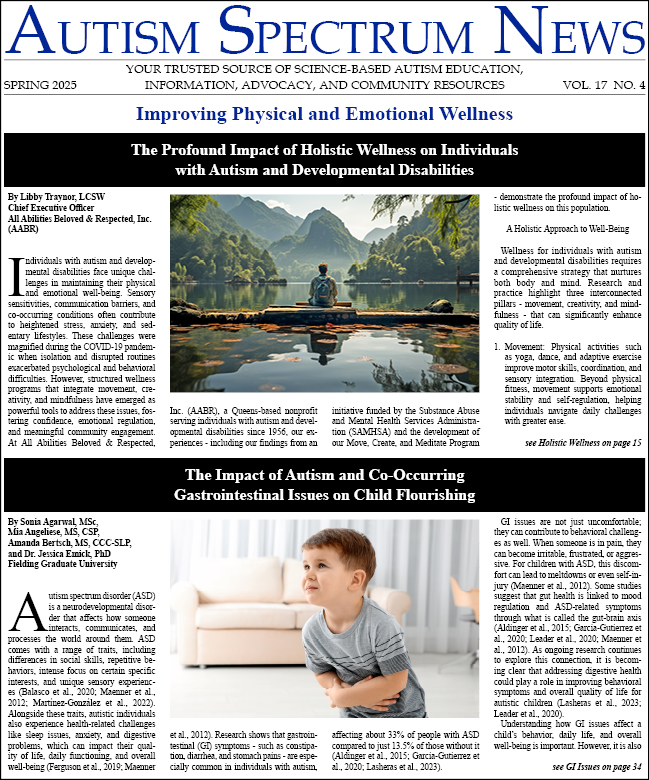-
Exploring Recreation Therapy for Individuals with Autism: Exercise to Improve Socialization, Self-confidence, and Independence
Key Points: Exercise is a proven, evidence-based intervention for individuals with autism, promoting development in social, emotional, and independent skills. Recreation therapy interventions, including exercise, have been effective in helping individuals with autism achieve their...
-
The Importance of Fitness Training for Autistic Individuals
Key Points: Individuals with autism have traditionally tended to live more sedentary lifestyles, which contributes to increased risk for both physical and mental health conditions. To reverse this trend, a variety of physical activity and sport-based training programs are now being offered...
-
The Value of Facilitating Social Groups for Autistic Adults in a Community Mental Health Setting
Providing comprehensive and meaningful therapeutic services for autistic adult clients in a community mental health center requires offering a range of therapeutic groups within which a client can work to reach their potential in a way that might not be possible via individual therapy sessions...
-
Charting New Paths to Wellbeing: Catalight’s Compass Behavioral Program Launched This Month
In an industry where a one-size-fits-all approach to treatment is too often the norm, Catalight’s new Compass Behavioral program teaches neurodivergent teens and young adults life skills that are important to them and their idea of future success. The innovative treatment option truly places the...
-
A Developmental Map to Social Success
Unusual, strained, or scarce social interactions often constitute many of the visible and distinct indicators of Autism Spectrum Disorder (ASD). Formal diagnostic descriptions, professional resources, and firsthand accounts delineate innumerable examples of ASD-associated interpersonal behavior....
-
Asperger’s Skill Building Network: Practical Strategies for Transition and Change
Due to social skills deficits, the transition into life after school can be especially difficult for individuals with autism spectrum disorders, particularly those higher functioning individuals who required fewer supports in high school. With the prevalence of autism spectrum disorders increasing...
-
College Students Empower Middle/High School Students on the Autism Spectrum with a Foundation for Self-Expression and Social Skills
At the AHRC New York City Middle/High School in Brooklyn, New York, students on the autism spectrum are benefiting from a community engagement program called Catching a Dream at Pace University, as part of the outreach goals of the university. The program consists of engaging the high school...
-
From Research to Practice: Social Skills Training in a Clinical Setting
The ability to develop and maintain interpersonal relationships is a cornerstone of successful child development and among the greatest challenges for children with autism spectrum disorders (ASD; Church, Alisanski, and Amanullah, 2000). Effective interpersonal relationship skills are important for...
-
Humor is Important to Your Child’s Social Development
Humor is important for children because being able to tell jokes and laugh with others helps them interact and make friends. Unfortunately, children diagnosed with autism spectrum disorder (ASD) tell significantly fewer jokes than their typical peers. Not being able to understand humor or inspire...
-
I Finally Feel Like I Belong
I was one of the unpopular kids. I was never invited to birthday parties or sleepovers. I had no friends, and no one wanted to hang out with me. I was a social leper and I hated every second of it. High school was supposed to revolutionize my life. “Students are more mature in high...




